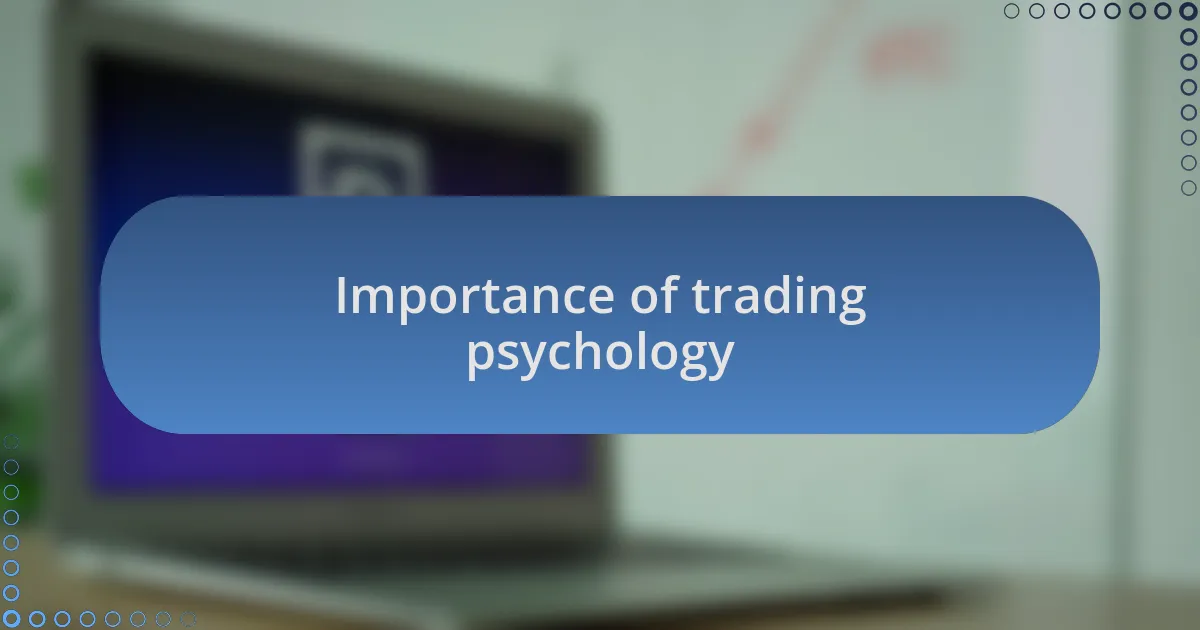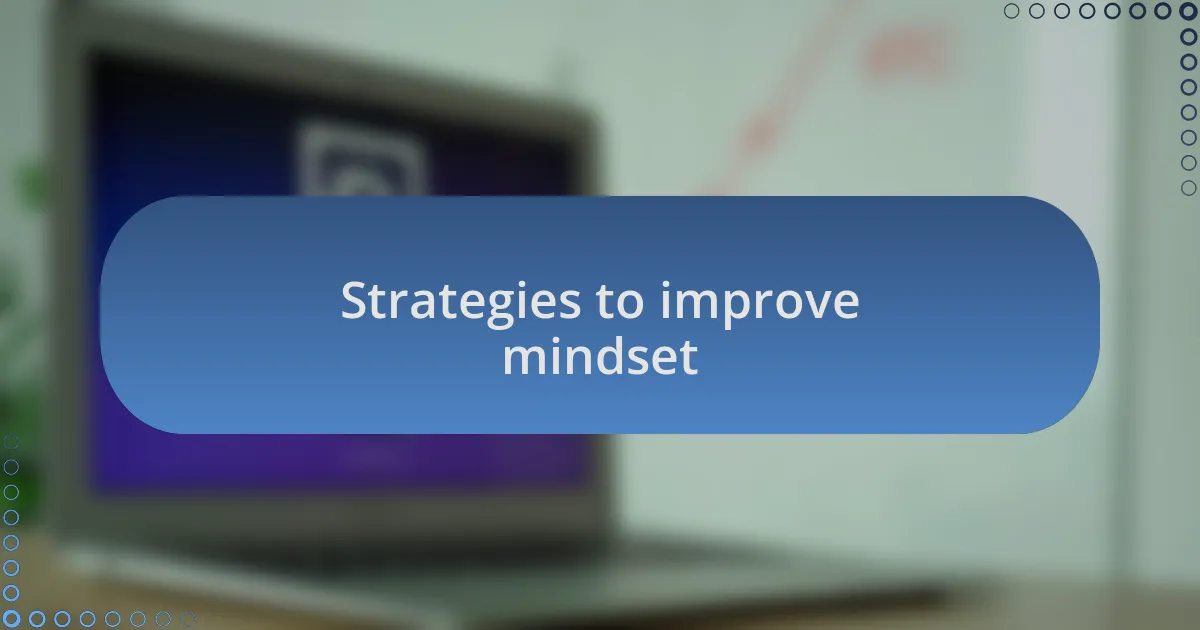Key takeaways:
- Trading psychology plays a crucial role in decision-making, influenced by emotions such as fear and greed.
- Self-awareness and mindfulness practices can enhance emotional resilience and improve trading discipline.
- Common psychological challenges include fear of missing out, loss aversion, and overconfidence, which can adversely affect trading outcomes.
- Establishing a routine, journaling trades, and seeking community support are effective strategies for maintaining a balanced mindset.

Understanding trading psychology
Trading psychology is often the overlooked factor that can make or break a trader. I’ve experienced moments of sheer panic when the market took unexpected turns, leaving me questioning my decisions. It’s fascinating to realize how our emotions can cloud our judgment; have you ever felt that rush of greed when prices soar, only to watch them plummet when you least expected it?
Understanding the mental landscape of trading isn’t just about managing fear and greed; it’s also about self-awareness. One time, I found myself doubling down on a losing trade because I couldn’t accept being wrong. That moment illuminated how ego plays a role—do we let pride dictate our trades, or do we learn from our mistakes and adapt our strategy?
It’s important to recognize that trading isn’t merely a technical endeavor; it requires emotional resilience. I often reflect on how certain trades linger in memory, not because of the outcome, but because of the emotions they stirred up. Have you noticed how some decisions stick with you long after the trade is closed? This reflective practice can enhance our understanding of our own trading behavior and help mold a more disciplined approach.

Importance of trading psychology
Recognizing the importance of trading psychology is essential for anyone engaged in the market. I recall a time when I entered a trade based purely on market hype, ignoring those nagging doubts in my gut. That experience taught me a valuable lesson: if I don’t trust my intuition, I risk becoming a slave to the market’s whims.
The emotional rollercoaster of trading can lead to impulsive decisions that derail our strategies. I once watched my portfolio fluctuate wildly after making a snap decision in a fit of excitement, which ultimately resulted in a loss. This taught me the importance of cultivating patience; each trade deserves a clear, rational thought process rather than a reaction to fleeting emotions.
Moreover, managing our emotional responses is just as critical as developing technical skills. In moments of uncertainty, I’ve learned to step back and assess my mindset. How often do we act out of fear or overconfidence instead of analyzing the situation? This kind of self-awareness can be transformative, allowing traders like us to make decisions aligned with our goals rather than our emotions.

Common psychological challenges
One common psychological challenge traders face is the fear of missing out (FOMO). I remember a time when I watched a cryptocurrency surge while I hesitated, grappling with doubt. The moment I finally jumped in, the price plummeted, leaving me frustrated and questioning my judgment. Have you experienced that anxious rush to enter a trade, only to find yourself chasing losses?
Another significant hurdle is the struggle with loss aversion; it’s astonishing how our brains are wired to feel losses more acutely than gains. I once held onto a failing investment, convinced it would rebound, simply because I couldn’t bear the thought of realizing a loss. Reflecting on it, I wonder—how many traders cling to their positions, hoping against hope, rather than cutting their losses and moving on?
Additionally, the battle against overconfidence can be perilous. I’ve often felt invincible after a series of successful trades, only to later discover that this mindset can blind us to critical market shifts. It begs the question: how do we balance confidence with caution? For me, staying grounded amidst success has been crucial, reminding myself that every market can turn unexpectedly.

Strategies to improve mindset
One effective strategy for improving mindset is establishing a routine that incorporates mindfulness techniques. I often start my trading day with a few moments of deep breathing and reflection. This practice helps clear my mind of distractions and allows me to focus on my trading plan. Have you ever noticed how a calm mindset can lead to clearer decision-making?
Another approach that has been beneficial for me is journaling my trades and emotions. By documenting not just the numbers, but also my thoughts and feelings during each trade, I’ve gained insight into my emotional triggers. This habit prompts me to ask myself: what lessons can I draw from both my successes and failures? The act of writing serves as a mirror, showing me patterns I might otherwise overlook.
Lastly, seeking community support can be a game changer. Engaging in discussions with fellow traders helps me gain different perspectives and strategies. I think about the times when I shared my anxieties or uncertainties, only to find others relate or offer valuable advice. How great is it to know you’re not alone in this journey?

Personal experiences in trading
Trading, for me, has often felt like an emotional rollercoaster. There was a time when a sudden market dip sent my heart racing, making me second-guess my strategies. I vividly recall a day when I panicked and sold my assets at a loss. Looking back, I realize that my fear clouded my judgment, leading to a decision I regretted. Have you ever let emotions dictate your trades?
I remember another instance where I experienced the power of patience. Holding onto a position despite market fluctuations tested my resolve. A few weeks later, I watched my investment grow significantly. That moment taught me the importance of trusting my research and not succumbing to daily noise. It’s fascinating how a little faith in yourself can lead to such rewarding outcomes.
I’ve also found that celebrating small wins boosts my confidence. After successfully executing a trade, I make it a point to acknowledge my decision-making process, not just the outcome. It’s almost like a little pat on the back from myself. How do you celebrate your trading victories? Recognizing these moments helps build a positive feedback loop, reinforcing my commitment to continual improvement.

Tips for maintaining discipline
Staying disciplined in trading is all about having a clear plan and sticking to it, no matter how the market behaves. I remember a time when I wrote down my trading goals and laid out specific entry and exit points for each trade. When volatility hit, I was tempted to veer off course. However, I kept reminding myself of that plan, and it helped me resist impulsive decisions. How often do you find yourself drifting away from your trading strategy when things get tough?
Another key strategy for maintaining discipline is to limit your trades. At one point, I noticed that trading too frequently led to fatigue and mistakes. So, I decided to set a maximum number of trades per week. This not only reduced my stress but also ensured that I was only making informed trades. Isn’t it interesting how sometimes less truly is more in the world of trading?
Lastly, I’ve discovered the power of reflection. After each trading session, I take a moment to review my decisions and emotions during the trades. I jot down what went well and what didn’t, which allows me to learn from my experiences. This practice has helped solidify my discipline, acting almost like a personal accountability partner. Does reflecting on your past trades ever help you stay focused on your trading goals?